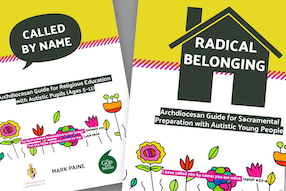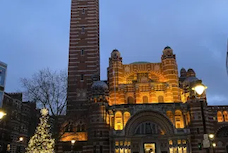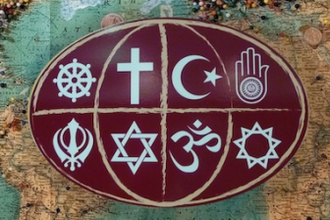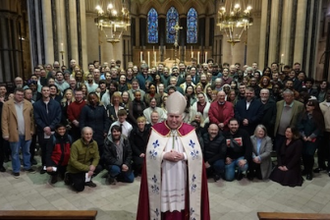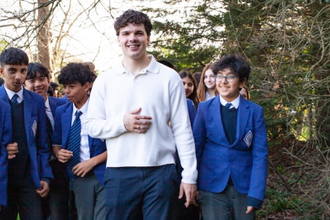Birmingham: Archbishop Longley's reflection at J&P Assembly
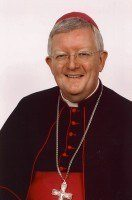
Archbishop Bernard
Birmingham Archdiocese Justice and Peace online Assembly last week focused on 'The Climate Emergency'. Archbishop Bernard Longley of Birmingham gave the following reflection during the concluding liturgy on Sunday 4 October, the Feast of St Francis of Assisi.
I am delighted to join you this evening at the conclusion of the Justice and Peace online assembly and I want to thank our diocesan Justice and Peace Commission members and all those who work so hard in the course of the year to promote and seek to live by the values of the Kingdom of God.
The parable of the mustard seed in St Matthew's Gospel offers a real encouragement to recognise the true worth and the transformative value and impact of even the smallest gesture or act in cherishing the created world that is God's gift to us and to future generations.
During the Season of Creation, we should keep before us the message of our Holy Father' encyclical letter about the environment 'Laudato Si' or 'Care of our Common Home'. He makes an urgent and passionate appeal to the whole human family to take responsibility for "caring for our common home". I want to re-iterate some of Pope Francis's emphases in that document before looking briefly at his most recent Encyclical Letter, Fratelli tutti published today.
When we take in all that is happening to God's creation - all that has been entrusted to us - we can deepen our share in the exercise of God's loving mercy. The basic question Pope Francis asks is: "What kind of world do we want to leave to those who come after us, to children who are now growing up?" He reminds us never to forget the intimate relationship between the fragility of our planet and the poor. They are the ones who suffer the most from the way our earth has been mistreated and abused. We need to listen to the cries of both, he says, and undergo an "ecological conversion". We need to show God's mercy.
The encyclical's title, Laudato Si', is from St Francis' well-known Canticle of the Creatures. Those opening words - 'Praise be to you, my Lord…' - remind us that the earth, our common home, is "like a sister with whom we share our life and a beautiful mother who opens her arms to embrace us." As an intrinsic part of the earth, each one of us has a place in the dialogue we need to begin. In this comprehensive presentation of Catholic social teaching on the environment, Pope Francis shows that peace, justice and the preservation of creation are intimately interconnected.
The Scriptures demonstrate that human life is founded upon three fundamental and closely intertwined relationships: with God, with our neighbour and with the earth itself. This implies a relationship of mutual responsibility between human beings and nature. As Pope Francis says, "Our relationship with nature is inseparable from fraternity, justice and faithfulness to others."
At the heart of Laudato Si' is an alternative pattern of justice, an integral ecology which respects our unique place in this world as human beings and our relationship to our surroundings. Since we are in fact part of nature we are not faced with two separate crises, but rather one complex crisis which is both social and environmental. Pope Francis sees human ecology as inseparable from the notion of the common good and making a preferential option for the poorest of our brothers and sisters.
This is the point that Pope Francis has now taken up in his new Encyclical Letter On Fraternity and Social Friendship. I would like to offer a few quotable quotes from my very cursory reading of Fratelli tutti this afternoon.
Regarding the background inspiration and sources:
I have felt particularly encouraged by the Grand Imam Ahmad Al-Tayyeb, with whom I met in Abu Dhabi, where we declared that "God has created all human beings equal in rights, duties and dignity, and has called them to live together as brothers and sisters".[5] This was no mere diplomatic gesture, but a reflection born of dialogue and common commitment. The present Encyclical takes up and develops some of the great themes raised in the Document that we both signed. I have also incorporated, along with my own thoughts, a number of letters, documents and considerations that I have received from many individuals and groups throughout the world.
In its 287 sections there are 288 citations including documents from the Bishops of South Africa and the Bishops of South Korea. At the very end of the Encyclical Pope Francis acknowledges:
In these pages of reflection on universal fraternity, I felt inspired particularly by Saint Francis of Assisi, but also by others of our brothers and sisters who are not Catholics: Martin Luther King, Desmond Tutu, Mahatma Gandhi and many more. Yet I would like to conclude by mentioning another person of deep faith who, drawing upon his intense experience of God, made a journey of transformation towards feeling a brother to all. I am speaking of Blessed Charles de Foucauld.
He explains something of the purpose of the Encyclical:
The following pages do not claim to offer a complete teaching on fraternal love, but rather to consider its universal scope, its openness to every man and woman. I offer this social Encyclical as a modest contribution to continued reflection, in the hope that in the face of present-day attempts to eliminate or ignore others, we may prove capable of responding with a new vision of fraternity and social friendship that will not remain at the level of words. Although I have written it from the Christian convictions that inspire and sustain me, I have sought to make this reflection an invitation to dialogue among all people of good will.
And he reflects on the significant current context of Fratelli tutti:
As I was writing this letter, the Covid-19 pandemic unexpectedly erupted, exposing our false securities. Aside from the different ways that various countries responded to the crisis, their inability to work together became quite evident. For all our hyper-connectivity, we witnessed a fragmentation that made it more difficult to resolve problems that affect us all. Anyone who thinks that the only lesson to be learned was the need to improve what we were already doing, or to refine existing systems and regulations, is denying reality.
Once this health crisis passes, our worst response would be to plunge even more deeply into feverish consumerism and new forms of egotistic self-preservation. God willing, after all this, we will think no longer in terms of "them" and "those", but only "us".
The first chapter Dark Clouds over a Closed World considers:
- New forms of cultural colonization:
One effective way to weaken historical consciousness, critical thinking, the struggle for justice and the processes of integration is to empty great words of their meaning or to manipulate them. Nowadays, what do certain words like democracy, freedom, justice or unity really mean? They have been bent and shaped to serve as tools for domination, as meaningless tags that can be used to justify any action.
Insufficiently universal human rights:
- It frequently becomes clear that, in practice, human rights are not equal for all.
Migration:
I realize that some people are hesitant and fearful with regard to migrants. I consider this part of our natural instinct of self-defence. Yet it is also true that an individual and a people are only fruitful and productive if they are able to develop a creative openness to others. I ask everyone to move beyond those primal reactions.
Introducing the rest of the Encyclical Pope Francis says: Despite these dark clouds, which may not be ignored, I would like in the following pages to take up and discuss many new paths of hope.
Then on the basis of a reflection on the Parable of the Good Samaritan Pope Francis offers a considered reflection on a number of themes, including:
Re-envisaging the social role of property:
The principle of the common use of created goods is the "first principle of the whole ethical and social order";[96] it is a natural and inherent right that takes priority over others.[97] All other rights having to do with the goods necessary for the integral fulfilment of persons, including that of private property or any other type of property, should - in the words of Saint Paul VI - "in no way hinder [this right], but should actively facilitate its implementation".[98] The right to private property can only be considered a secondary natural right, derived from the principle of the universal destination of created goods. This has concrete consequences that ought to be reflected in the workings of society. Yet it often happens that secondary rights displace primary and overriding rights, in practice making them irrelevant.
A better kind of politics:
The development of a global community of fraternity based on the practice of social friendship on the part of peoples and nations calls for a better kind of politics, one truly at the service of the common good. Sadly, politics today often takes forms that hinder progress towards a different world.
Dialogue and friendship in society:
Approaching, speaking, listening, looking at, coming to know and understand one another, and to find common ground: all these things are summed up in the one word "dialogue". If we want to encounter and help one another, we have to dialogue.
Religions at the service of fraternity in our world
A journey of peace is possible between religions. Its point of departure must be God's way of seeing things. "God does not see with his eyes, God sees with his heart. And God's love is the same for everyone, regardless of religion. Even if they are atheists, his love is the same. When the last day comes, and there is sufficient light to see things as they really are, we are going to find ourselves quite surprised".
I hope that this very superficial reflection on a few of Fratelli tutti 's many important themes will have whetted your appetite to read the whole Encyclical. It will be interesting over the coming days to see the worldwide reaction to its insights and in particular to consider how we can reflect on it, not only within the Catholic Church in our Archdiocese but also ecumenically and with our friends in the other faith communities where Pope Francis has already drawn such encouragement.
All Assembly sessions are available at: www.birminghamjandp.org.uk/annual-assemblies.html



